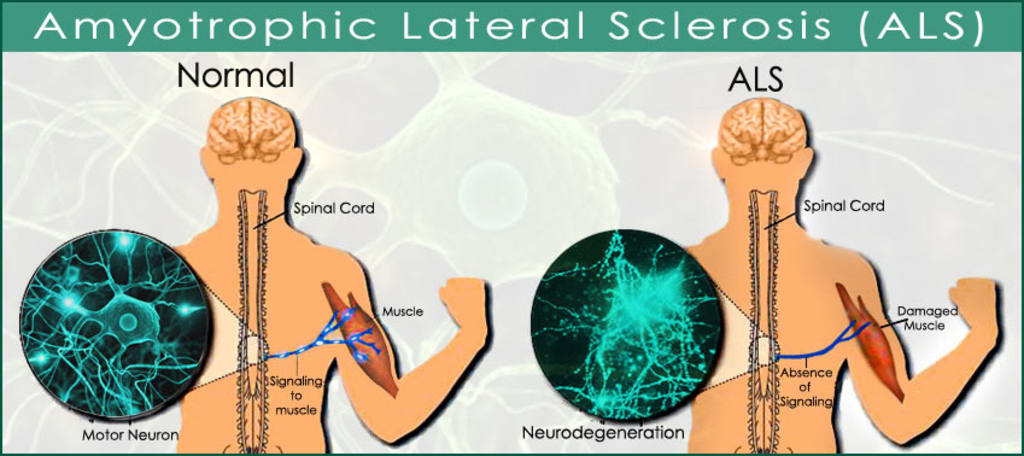Therapies for Amyotrophic Lateral Sclerosis (ALS)
Moving Forward with a Cure

ALS is a degenerative disease of the motor neurons. The cause of it is largely unknown as 90 percent of cases have no genetic inheritance and only 20 genes have been identified as having an effect in genetic cases, but how they cause motor neuron loss is unknown. Atrophy, or shrinking, of the motor neurons leads to muscle atrophy and stiffness. Muscle cells die because of an influx of calcium and the lack of calcium binding proteins outside of the cells. This causes calcium channels to open and dangerously increase intracellular levels of calcium, killing the motor neurons.
It can cause malnutrition as a side effect due to tongue atrophy, closed larynx, and diaphragm dysfunction. It can also cause trouble breathing due to the atrophy of respiratory diaphragm muscles and the degeneration of the pre-Bötzinger complex in the brain which controls movement of diaphragm muscles and controls breathing. Other symptoms include weak limbs, nerve death, dementia, and speech and swallowing difficulties. It is currently incurable, but hopefully, stem cell research and work with nerve growth factors may pave the way to a brighter future.
ALS is a complex disorder with multiple aspects of pathology associated with it. Proteins and lipids (fats) undergo a process called oxidative stress where free radicals (unbound oxygen atoms) bind to cells, changing their shape and functionality. This damage to DNA affects the motor neurons in ALS and leads to toxic levels of glutamate in motor neuron synapses, preventing their function. Mitochondria, major energy and oxygen suppliers in cells, also become deficient and are damaged by the free radicals. This can trigger a cascade of events leading to cell death in the motor neurons.
So what can we do?
The precise pathology of ALS is unknown, so precise treatment cannot be developed at the moment. However the best strategy is to rescue the motor neurons from degeneration and preserve the neuromuscular junctions between neurons and muscles to preserve the relay of information. Therefore the most promising solution is to inject neurotrophic factors, growth factors that enhance neuronal growth. They are often safer avenues of therapy and can reach the brain due to their ability to diffuse through the blood brain barrier. However the amount that actually makes it into the brain is small, so it does not have the greatest efficacy.
Growth factors include brain-derived neurotrophic factor which plays a role in the growth and survival of neurons in the brain, and when given in high doses to people with advanced ALS, their survival chances increase.
Another area of research is the replacement of motor neurons with neurons grown from embryonic stem cells. There is a lot of controversy surrounding these cells, as obtaining them involves the destruction of embryos and the risk of developing tumors is higher due to their ability to become any cell in the body. However in ALS research they have been found to change into motor neurons and spread throughout the body connecting to muscles and massively improving symptoms. Neural stem cells are also another promising avenue, and are safer due to their decided fate of only becoming neural cells. They have been found to be safe in FDA trials and help prolong survival in ALS patients.
Bone marrow derived mesenchymal stem cells can promote motor neuron survival. These cells can become any cell including osteocytes for bone, adipocytes for fat cells, and of course neural cells. They have a limited effect on replacing full neurons, but can improve motor function and reduce disease progression.
However research has a long way to go for ALS, but with science and stem cell research rapidly advancing, the cure may not be as far away as you think.






Comments
There are no comments for this story
Be the first to respond and start the conversation.